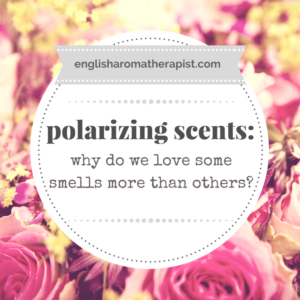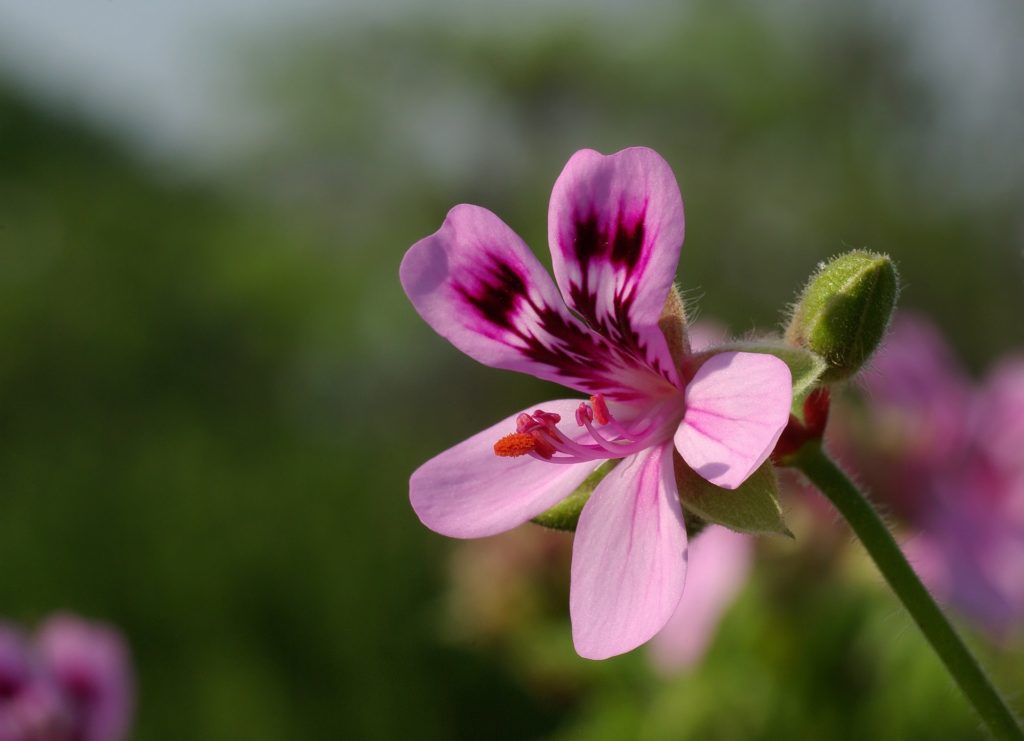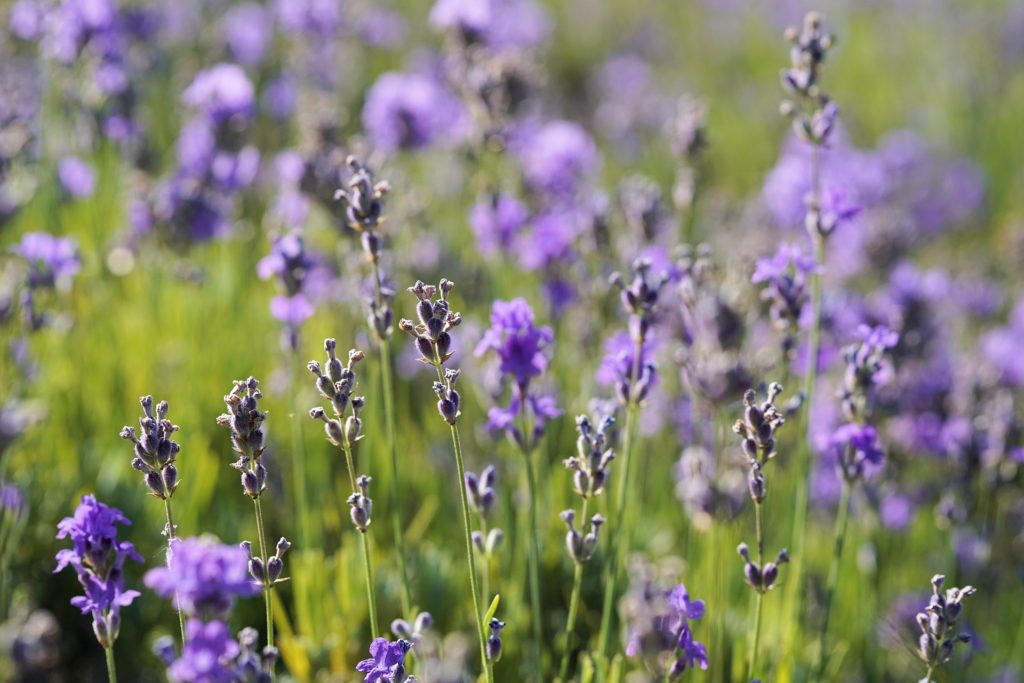Polarizing Scents

If you were an essential oil, which one would you be?
I’ve always been drawn towards Geranium (Pelargonium graveolens). There’s something about its scent that I find amazingly calming and comforting – it’s powerful, without being overpowering. It’s sweet, without being sickly. To me, it’s the scent of nature: floral and green, with earthy undertones.
How do we perceive smells, and why do they elicit such strong reactions from us? Why do we like some smells more than others? How can one person love a scent that another person finds repulsive?
Sometimes we feel an inexplicable affinity with a particular scent, just as we can feel a connection to another person. Have you ever met a complete stranger and just ‘clicked’? That’s how I feel when I smell Geranium essential oil – it just feels right!

But its strong, floral aroma is certainly not for everyone, as I discovered on my journey into the world of aromatherapy. I’m always fascinated to learn about how we perceive smells differently – as they say, one man’s meat is another man’s poison. Scents can be incredibly polarizing. What’s pleasing to one olfactory system can be positively putrid to the next. I’m well aware that many of you absolutely HATE geranium oil and will be wrinkling your nose in disgust as you read this!
As a member of numerous Facebook groups, I’m often amused to see people expressing their utmost distaste for Geranium oil, with comments comparing it to just about every unsavoury stench you can imagine. Meanwhile, I’m blissfully inhaling the same scent from my diffuser bracelet and wondering how we can interpret smells in such vividly contrasting ways!
As one of the more strongly-scented oils, Geranium is perhaps more likely to provoke such polarization. Whether you love it or loathe it, you’ll probably feel strongly about your opinion. For this reason, I like to think of Geranium as being the “Marmite” of essential oils – that is, something you either love or hate. Despite this, Geranium remains one of the most commonly used oils in aromatherapy.
In life, there are some people who are universally popular: the Lavenders and the Roses of this world. But there are some folks who aren’t always well-liked, the ones who are not everyone’s cup of tea. Geranium belongs to that club, which is perhaps why I feel such an affinity towards it!

Scent Perception
There is no simple explanation as to why we feel drawn towards certain scents more than others. As aromatherapists, we understand that our olfactory system is closely linked to the limbic system of the brain.
We have a memory-based response to smell. This is why the slightest whiff of something can instantly trigger a vivid emotional reaction. Sometimes, the link is obvious – the smell of sun lotion that reminds you of a summer holiday; the distinctive aftershave of an ex-boyfriend; or the mouth-watering scent of your favourite childhood recipe.
Smells do not just trigger memories, but the emotions attached to those memories. These odour-based recollections can be deeply rooted and difficult to erase. Sometimes a subconscious aversion can stem from a ‘forgotten memory’ attached to that particular scent.
Our brain registers a greater response the first time we associate a smell with something. This explains why smells often take us back to our childhood, when we first encountered them.
Our perception of smell is highly subjective. Studies have found that the same scent can be interpreted in vastly different ways between people. Our personalized sense of smell is partly due to genetics – such as our perception of the herb coriander (cilantro), which has been linked to variations in the OR6A2 olfactory receptor.

It’s thought we can have our own individual perception of sensory experiences, known as qualia. As the philosopher Daniel Dennett described, qualia relates to “the ways things seem to us”. This can perhaps partly explain why essential oils elicit such different reactions among us. What smells floral to one person can smell urinous to another.
Sometimes we dislike a smell on the basis that it is unfamiliar. But one shouldn’t write off certain essential oils forever – I have grown to like Chamomile over time, and perhaps one day I will even be able to use Vetiver without wincing (sorry Vetiver, but we are not scent soulmates!).
In aromatherapy, it’s often claimed that if you dislike the smell of a particular essential oil it means your body needs it. From a marketing point of view, you can understand the logic – don’t just buy the oils you like, buy the ones you don’t like too! But in reality, there is no scientific evidence to back up this claim.
“Smell is a potent wizard that transports you across thousands of miles and all the years you have lived.” – Helen Keller
The importance of smell
Scientists have discovered that more of the brain is devoted to processing smells than originally thought. Although often underestimated, smell is our most primal and intuitive sense.
Unlike other senses, smells bypass the thalamus (the ‘sensory gatekeeper’) and travel directly to the brain. Even without us consciously registering a smell, it sends an immediate signal to our brain – something that has played a vital role in our survival throughout evolution.
Until fairly recently, it was thought that humans could detect around 10,000 different smells. Now, scientists have discovered we can actually identify far more than this – the number is more in the region of 1 trillion! Research has shown that we only utilise a tiny proportion of our olfactory power.

How do we smell?
The human olfaction process is fascinatingly complex. In fact, the exact way we perceive smells is not fully understood and remains a subject of debate. Traditionally, our perception of smell is attributed to the shape theory of molecules, known as the ‘lock and key’ method. A particular smell triggers a unique combination of our olfactory receptors and transmits this signal to the brain with a message – such as “this is the smell of coffee” or “this is the smell of frying bacon”. A somewhat controversial alternative theory suggests a quantum effect, based on the vibrational energy of molecules.
Does smell perception matter?
In aromatherapy, essential oils are used to enhance our wellbeing. As inhalation is an important element of the way in which essential oils work, is it vital that we find their smell pleasant? It perhaps depends on the objective of the treatment. For stress relief, it is clearly more important to choose oils that you find relaxing and agreeable. One cannot fully relax while inhaling something perceived to be truly repellent. At the same time, it could be argued that some oils, such as Tea Tree, provide a role that is more functional in nature.
Of course, it’s natural to feel drawn towards those essential oils that you perceive to be heavenly. This explains why Geranium is always on my re-order list of essential oils! Polarizing or not, it is a fabulous oil to have in your collection. So, which side are you on – are you a lover or a hater of Geranium?
Did you know?
Pelargonium is the second largest genus (after Geranium) within the Geraniaceae family, including over 200 species. Confusingly, plants within the Pelargonium genus are given the generic name of ‘Geraniums’, although they are not part of the Geranium genus.
* This article was first published in Aroma Culture, a beautiful monthly magazine about herbalism and aromatherapy. Subscribe today and enjoy fascinating articles, case studies and recipes delivered to your inbox every month!

What to Read Next:
Sorry, There is No Magic Formula
Follow me on...
Share this on...
